
The King’s School is a Christian community that seeks to make an outstanding impact for the good of society through its students, and by the quality of its teaching and leadership in education.
THE KING’S SCHOOL MISSION STATEMENT


The King’s School is a Christian community that seeks to make an outstanding impact for the good of society through its students, and by the quality of its teaching and leadership in education.
THE KING’S SCHOOL MISSION STATEMENT
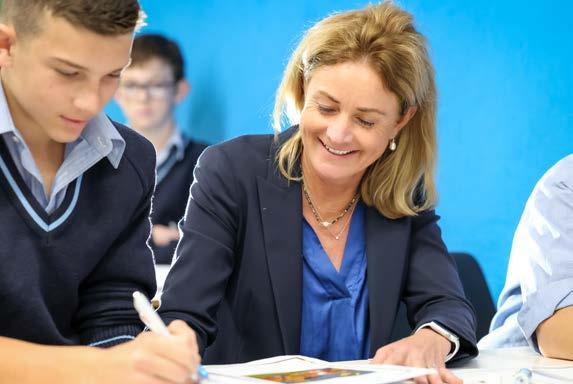
In 1832, Archdeacon William Grant Broughton declared that the education in The King’s School is not for the exclusive benefit of those upon whom it is bestowed, but for that of the entire community.
Educational Support Services (ESS) is a wonderful example of how one student’s journey can provide benefits to many.
It is our commitment that ESS will meet students at their level of learning, supporting them towards leading confident and independent lives after graduation from The King’s School.
We know that every student at our School has their own set of unique capabilities. Some students will thrive through academia, whilst others reach their potential through a more practical and specialised environment. ESS aims to cater for all students by providing a bespoke program that allows every individual to meet academic curriculum requirements.
ESS at King’s is designed to demonstrate leadership in education by facilitating student learning through encouragement, empowerment, personal growth, and academic learning. Outstanding teaching practices facilitate student learning by providing the necessary tools (both cognitive and personal) upon which to develop their understanding and encourage a love of learning.
Through the application of evidence-based practices and theories, teaching is continually adjusted and developed to meet individual learning profiles and to maximise a student’s potential in all walks of life.
Jordy Wickham Head of Educational Support Services
ESS at King’s is designed to demonstrate leadership in education by facilitating student learning through encouragement, empowerment, personal growth, and academic learning.
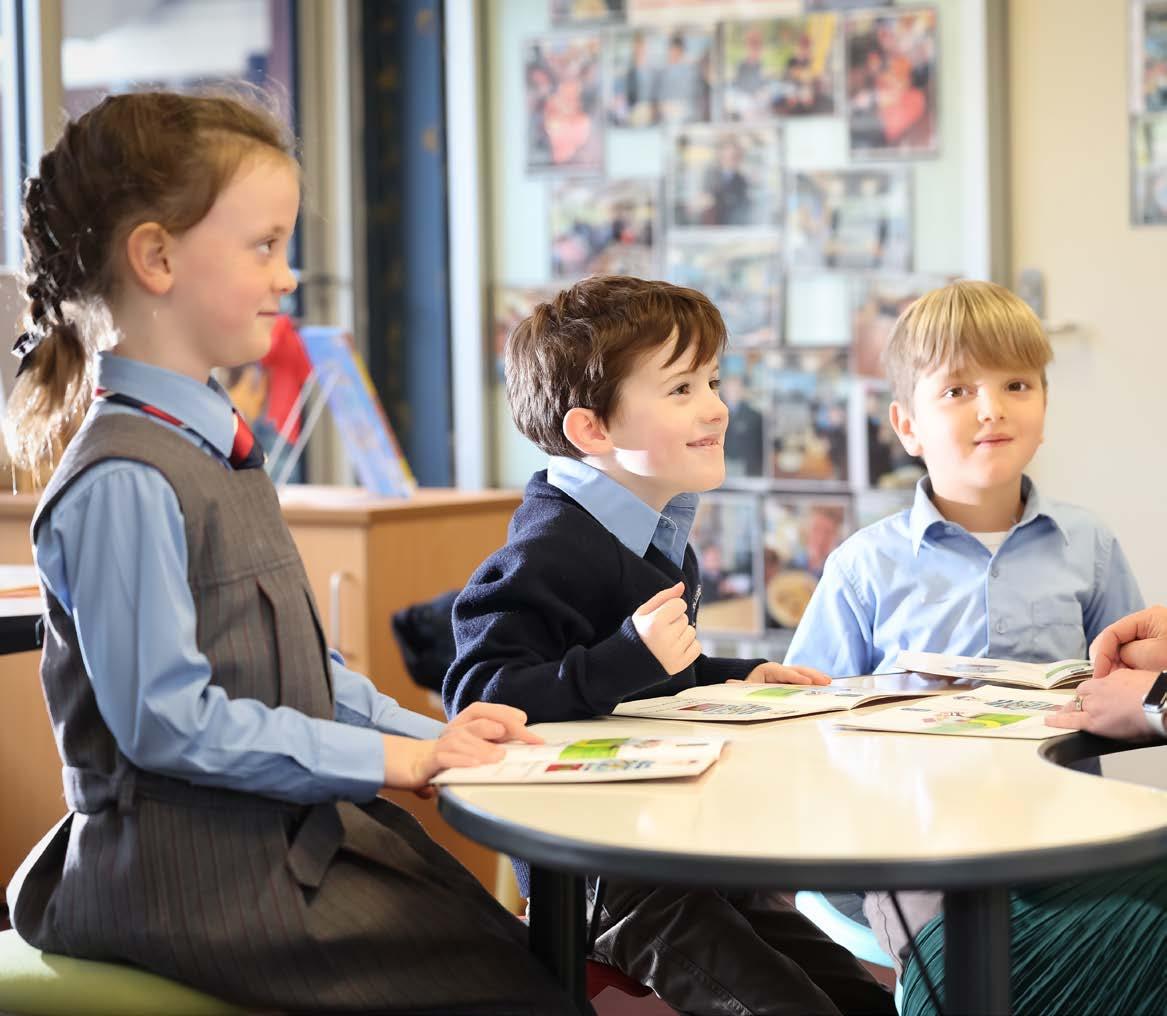
“It is our commitment that ESS will meet students at their level of learning, supporting them towards leading confident and independent lives after graduation from The King’s School.
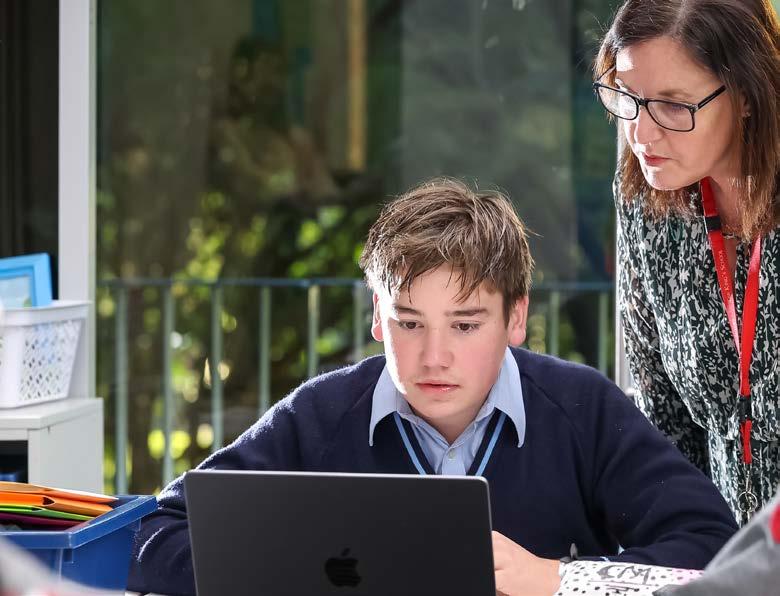


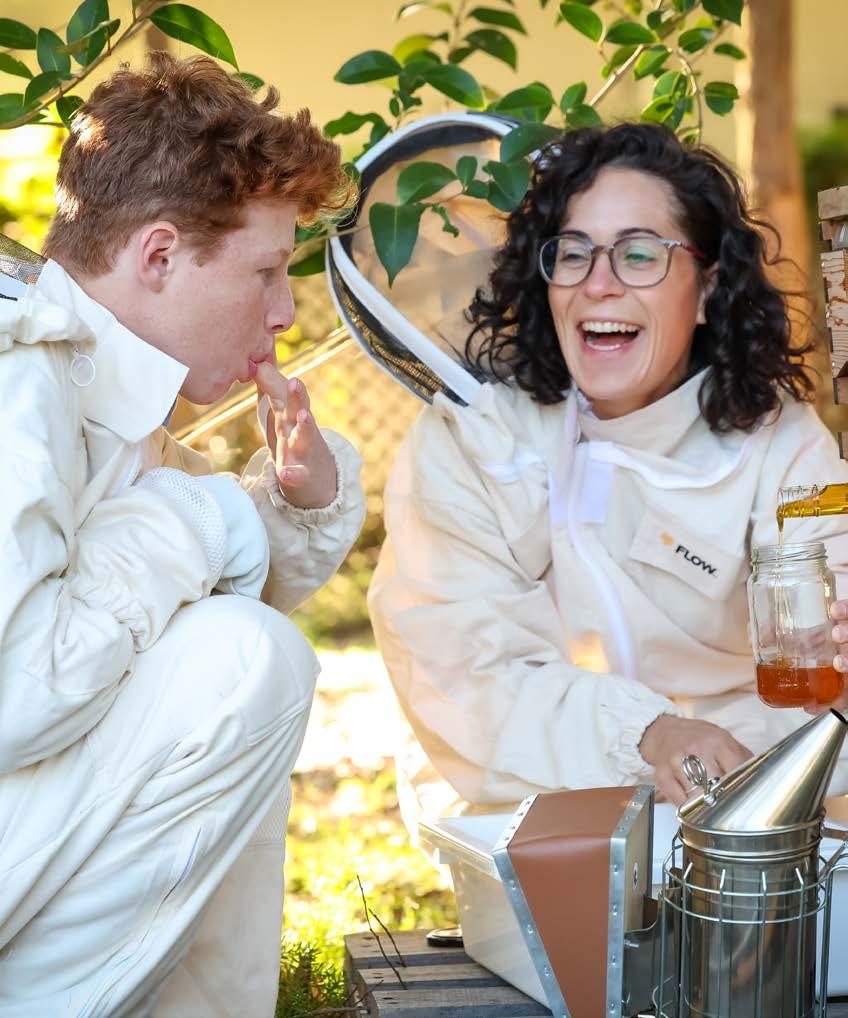

• Whole school promotion of differentiated practice with the support of the ESS Department and Enrichment and Extension
• Small class sizes
• In-class support
• Specialised Teachers
• Differentiated learning tasks, assessments and examinations
• Small class sizes
• In-class support
• Specialised teachers
• Differentiated learning tasks, assessments and examinations
• Direct and explicit instruction
• Life Skills curriculum
MOST STUDENTS
80-90 %
SOME STUDENTS 5-20 %
FEW STUDENTS 1-5 %
SOME STUDENTS 5-20 %
MOST STUDENTS
80-90 %
“
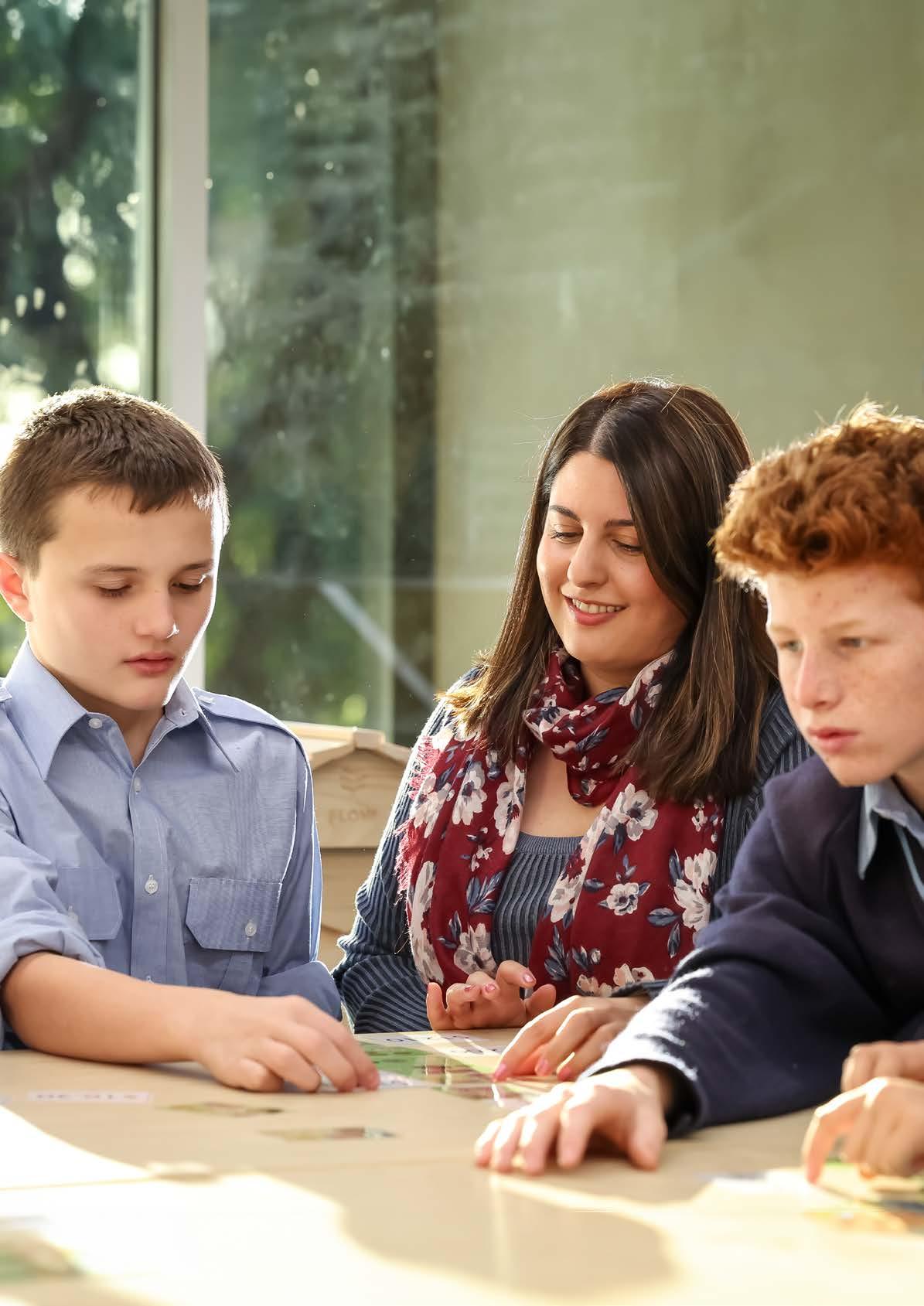
Collaborative curriculum planning is the process to determine the most appropriate curriculum options and adjustments for an individual student’s needs.

Through Collaborative Planning, a personalised pattern of study is designed. Personalised planning is a process that involves four stages. These stages will occur more than once during a student’s journey at school.
Collaborative curriculum planning is a process that determines the most appropriate curriculum options and adjustments for an individual student’s needs.
It involves a team with significant knowledge and understanding of the students in the program. The team comprises parents/carers, teachers, Head of Educational Support Services, Dean of Studies, Year Coordinator, Careers Adviser, Housemaster, Mentor, and other significant individuals in the student’s life. Most importantly, it also includes the student.
The personalised learning and support process is informed by:
• gathering information about the student’s learning strengths and needs
• the student’s background, including their cultural and family context
• assessing the available resources within the School and school staff capability
• examining the availability and practicality of external resources
• identifying the student’s goals and skills required for the future
• examining strategies for teaching
• determining timelines for reviewing goals and the planning process
In-class support consists of either a specialist teacher, teacher’s assistant or a gap student working with the class teacher. In-class support is implemented for students who have difficulty accessing teaching and learning content while assisting teachers in the delivery of subject content and strategies for students in need of assistance.
King’s uses a direct and explicit approach to English language acquisition. This means that teaching starts with an assessment of students’ foundational knowledge and a focus on firmly establishing fundamentals upon which to build new learning. The teaching of phonological awareness through the ESS program incorporates:
• diagnostic assessment
• direct and explicit instruction
• systematic and cumulative teaching
A key principle of the ‘K-10 Curriculum Framework’ that guides the K-10 syllabus development is that the curriculum must be inclusive of all students in NSW (NESA, 2004). Most students with special education needs will participate fully in the learning experiences and assessment activities provided by the regular syllabus outcomes and content. However, they may require additional support, including adjustments to teaching and learning activities and assessments. For some students, the Life Skills outcomes and content within each syllabus can provide a more relevant, accessible and meaningful curriculum option (NESA 2004).
The ESS Department, in conjunction with parents/ carers, Careers Adviser, Mentors and Housemasters, develops a curriculum option and learning pathway to ensure that such students engage in an educational and workplace program that is not only highly instructional, but also extremely beneficial and rewarding to the student’s future life. Goals are set and progress is stringently monitored to ensure that support is readily available if needed and that the student’s involvement and motivation do not waver.
Gifted and highly gifted students can often be asynchronous in their development, meaning aspects of their physical, intellectual, and emotional growth are out of step with each other. This can be frustrating for the student, their parents and teachers. The School’s Pastoral Care network of Mentors, Year Coordinators, Housemasters and School Counsellors is used to monitor each student in the Extension Program and assist them in reaching their full potential.
The ESS Department plays a crucial role in offering and managing disability provisions (exam accommodations) both for school-based exams and for the final exams. The Department collaborates with students, parents and teachers to identify individual needs and develop tailored strategies that ensure equitable access to exams. For any school-based exams, we can arrange modified classroom materials, assistive technology, rest breaks, readers and or scribes. When it comes to final exams, the department on behalf of your son will apply to the appropriate peak body asking that they grant your son the provisions that the School has implemented over the years. The Department ensures compliance with educational guidelines and adjusts supports as needed to provide a fair testing environment.
Itinerant teachers are usually qualified school teachers who have formal training in educating children with impairments. Itinerant teachers travel around local mainstream schools and communities to offer advice, resources, and support to students, teachers and parents. The ESS Department coordinates visits from Itinerant teachers to effectively assist students who have some form of impairment.
Withdrawal involves the removal of a student from the class for specific instruction within ESS by a specialist teacher. This type of intervention is used only when a student has intensive needs that cannot be met by additional support within the classroom. Withdrawal occurs regularly within the Tudor House and Preparatory environments. At the Senior Campus, ESS generally organises this type of support outside of classroom hours, although this is not always possible given timetabling and co-curricular commitments. In all cases, the student’s best interests are of paramount importance.
Some students learn easily and need to be extended, while other students struggle to engage in the teaching and learning outcomes at school. Through differentiation, students are provided with the opportunity to access the curriculum. Differentiation involves changing the pace, level or kind of instruction in response to learners’ needs, styles and interests. The ESS Department assists in the designing of resources and implementation of strategies to ensure that every student is included in the teaching and learning programs across the School curriculum.
ESS works very closely and collaboratively with subject specialists and classroom teachers to provide quality, engaging and motivational content and tasks appropriate to all students’ needs.
SENIOR SCHOOL
The Educational Support Services Homework Club operates from Monday to Thursday, commencing after school. Our ESS teaching staff have the important role of actively engaging students and providing support with assignments, organisation, study skills, general revision, pastoral care and welfare.
Early morning handwriting classes are held on Monday and Wednesday before school . These classes consist of a small number of students who require extra tuition for their handwriting scripts. In addition, students can use this time to catch up on homework tasks that they may have been unable to complete the night before.
Targeted literacy classes are available for selected students who require direct and explicit instruction in literacy skills and knowledge of the English language. This class is operated with just a small number of students to enable effective intervention. With a committed approach, these improved skills will assist students in all academic subjects and life beyond King’s. These classes are held on Tuesday and Thursday morning before school.

Students who work with the ESS Department in the Senior School undergo regular diagnostic assessments for reading, writing and spelling to closely monitor their progress. Parents are informed of these results at the end of each academic year. Whenever it is deemed appropriate, students may also be referred to specialists either inside or outside of the School community. In such cases, parents are asked to attend a meeting with the ESS Department where the concerns for a particular student are discussed, along with appropriate strategies to enable the student to forge ahead in their school life. At all times, the student’s best interests are the main concern.
At the Preparatory School and Tudor House, all students are tested in reading, spelling and mathematics. Results are analysed, and students of concern are identified collaboratively by the ESS team and class teachers. Reading benchmark assessments occur at the beginning of every term. Annual York Assessment of Reading for Comprehension (YARC) reading assessments are for students who have been identified as ‘at risk’. The Portable Appliance Tester (PAT) for literacy and numeracy is administered twice a year.
Many students arrive at The King’s School from countries where English is not their first language. Upon arrival, students are assessed by the ESS Department through language progressions, which determines their level of English language proficiency. Depending on their English literacy skills, students are supported to develop their knowledge of the English language and the Australian culture.
In Years 11 and 12, EAL/D students who have studied using English as their language of instruction for five years or less are eligible to enrol in the HSC EAL/D English Course. This course is designed for students from diverse non-English speaking, Aboriginal or Torres Strait Island backgrounds as designated by the course entry requirements. The students engage in a variety of language learning experiences to develop and consolidate their use, understanding and appreciation of English to enhance their personal, social and vocational lives.
The Senior School offers the Language Enrichment Program (LEP), to provide extra assistance to identified EAL/D students. The program teaches grammar, syntax, punctuation, and vocabulary. The LEP classes consist of tutorials four afternoons per week. These tutorials offer intensive English language tutoring, homework and examination assistance. This helps students keep pace with their peers and improve their fluency in written and spoken English.
Many students require more than just academic support. The ESS Department works very closely with School Counsellors, Housemasters, Mentors, Chaplaincy or equivalent (depending on the campus staffing framework), and other carers to assist students who require extra pastoral support.
This may include challenges such as the transition from Year 6 to Year 7, relocation from another country or school, family matters and other emotional problems. The ESS Department prides itself on the positive relationships it forms with past, current and future students and parents. Programs are put into place to care for and monitor these students who know only too well that ESS is a welcoming, safe, supportive and secure environment.
The King’s Inclusive Education Program is a personalised learning pathway for students with intellectual disabilities. Each student has a Personalised Learning Plan, which is holistic and incorporates academic learning and character development within a Christian community. This ensures students’ strengths are identified and fostered within a supportive environment. Interaction with peer groups and the broader King’s community is an integral part of the program.
The purpose of the King’s Inclusive Education Program is to support students who have intellectual disabilities. The class caters to students from Years 7 to 12 to become successful learners, develop social skills and build upon independent living skills. Overall, the aim is to assist students in becoming the best version of themselves to independently engage and thrive within their prospective communities.
The focus is on each individual students’ needs, to maximise their potential on a holistic basis. Personalised Learning Plans (PLP) are developed in consultation with parents, students, and relevant parties. These encompass academic learning (to their level of ability), social skills, interpersonal skills across various environments, community awareness, travel training, work experience, independent living skills and co-curricular activities including sports. These documents are carefully written to meet both NSW Education Standards Authority requirements and the specific needs of each learner.
Our main goal is to support students in becoming the best they can be, to be as independent as possible and to have a variety of choices when they leave school. To reach these goals, the King’s Inclusive Education Program addresses academic development, social skills and independence.
Students in the King’s Inclusive Education Program (KIEP) study courses, as required by NESA, work
towards meeting Life Skills outcomes. Students are taught a range of subjects, including English, Mathematics, History, Geography and Science by special education teachers in a small class setting. These courses are developed following the goals outlined in the PLP and are designed to consider the student’s capabilities. All students will be provided with supported mainstreaming opportunities in a range of classes including PDHPE, Music, Technology and Visual Arts. Teachers are constantly creating and adjusting resources to meet the needs of the students in the best possible way to foster learning and development.
Social and independent outcomes are determined in close collaboration with each student’s family. Targeted skills are taught in context according to relevance and need. They are taught explicitly, modelled, and practiced, in context, across a range of experiences within and outside of The King’s School. There are also opportunities to develop social skills through many structured occasions at organised events beyond the King’s community. It is important that students are involved in all areas of the school, including mentor groups, lunches, camps, sporting events, cadets, and excursions.
Students are assessed in terms of their achievement in the outcomes set in their PLP. Methods of assessment include observations, anecdotal records, practical tasks, formal tests, open book tests, reports, performance and oral presentations. The KIEP team are in regular contact with mainstream teachers and all tasks are modified to ensure that students in the program can access the curriculum.
The King’s Inclusive Education Program caters for students in Years 11 and 12. This is run by experienced special educators and is taught predominately in the KIEP classroom setting.

The Stage 6 Life Skills course aims to:
• Provide students with knowledge, skills and values that will enable them to maximise independence, productivity, and integration into the community.
• Facilitate a smooth transition from the School environment to a work or community setting.
• Establish links with leisure and recreational facilities in the local and surrounding communities and empower students to access these facilities independently.
• Enable further individualisation of students’ programs. Achieve goals set in each student’s Personalised Learning Plan with a focus on community living, personal management, independence, self-advocacy, and social integration.
In the final year of schooling, staff support students and families as they explore post-school options, organising meetings with various agencies, completing referral forms and providing travel training and orientation programs to new environments. Students often transition to work programs, further study at TAFE and/or part-time employment.
The King’s Inclusive Education program is capped at ten students, and preference is given to students in Year 7. Places are offered through the Admissions’s Office in consultation with key staff. The process of enrolment involves the following key steps:
1. An indication of interest, this can be done by contacting Admissions or the Head of Department at Educational Support Services directly.
2. An invitation to view the program and an opportunity to meet the team is extended. Parents are asked to register their interest by completing an Enrolment Application.
3. Information will be gathered in collaboration with prospective parents. These will include recent assessments, feedback from the student’s current school and observation.
4. Parents will be invited to an interview through the Admissions Office.
5. Depending on suitability, and an assessment and availability of places, an offer of placement may be extended. Ideally, notification is provided 6-12 months in advance.
Offers will also consider the balance of needs and abilities of students already participating in the program.
One class in both Year 7 and Year 8 is taught English, History and Geography by specialist teachers from ESS. The purpose is to provide consistency across key learning areas and demonstrate the relevance and connection to each subject area. Students receive explicit and detailed instruction to prepare them for the increased course content in Years 9 and 10.
Two additional English classes are also taught by specialist staff in both Years 7 and 8. It must be emphasised that although students will be covering the same topics as their year cohorts, they will not be delving into as much detail. The main emphasis is on the building blocks of the English language. However, this will not, in any way, impede students’ abilities to cope or access curriculum content in Years 9 and beyond. The methodology embraced will give students the necessary tools to comprehend, analyse, interpret and respond to the many diverse texts they are expected to access. The ESS Department encourages a strong home/school link with all parents/carers of students participating in our classes.
Language Arts is an elective taught within the Educational Support Services Department. It targets students who need to improve their literacy skills. Students are immersed in thematically based, highinterest units of work that provide opportunities to develop key literacy skills. These include vocabulary development, spelling, grammar, syntax, reading comprehension and the identification and written composition of various text types. These skills are transferable across the curriculum and prepare students for the final external Examinations.
In Years 9 and 10, students from a language background other than English may choose to enrol in the Language Arts Elective to supplement, consolidate and further develop their English language skills through an explicit approach to teaching English grammar and syntax. Progress is monitored by ongoing formative and summative assessments that provide frequent feedback and constant support for the student.
Disability Provisions
Homework Club
Spelling and Comprehension Classes

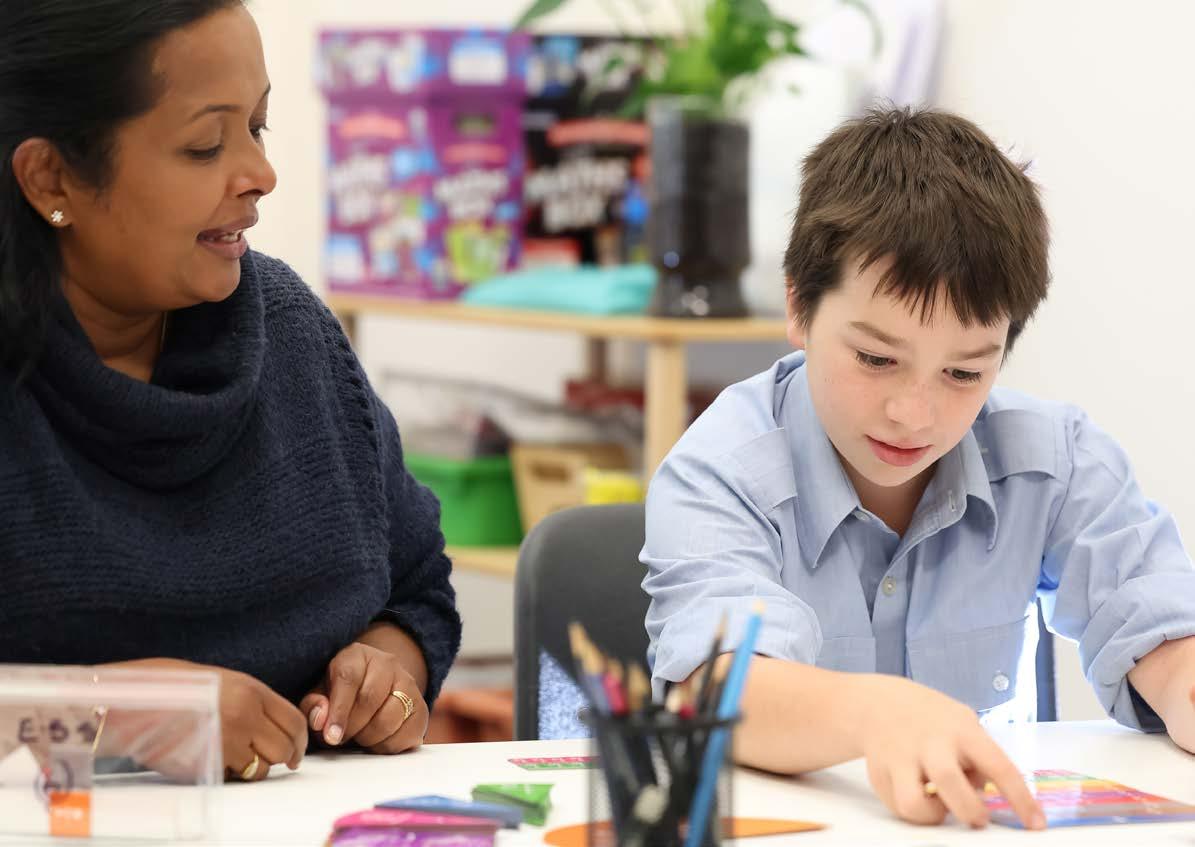
Students are invited to the Early Birds Program upon the recommendation of the ESS team or classroom teacher. These students have been identified as requiring specific literacy and numeracy support. This program is a 1:1 targeted intervention, where students work on individual goals created by the ESS teachers. The Early Bird Program runs from 7.30-8.25am on Monday, Tuesday, Wednesday and Thursday.
The Home Learning Program is open to all students in Years 3-6 on Monday-Thursday from 3.15-4.45pm. ESS teachers supervise these sessions on Monday and Tuesday to ensure individual students are given the support they need.
Students in Years 3 to 6 who have been identified as demonstrating significant challenges in their literacy
learning may require individual targeted support through either the MultiLit or Toe-by-Toe programs. The students receive support from trained ESS teachers or aides, with 30-minute sessions occurring three times each week. Additional activities are included during the intervention, such as the drilling of sight words and sounds, the decoding of words out of context, phonic-based spelling and a review of unfamiliar words from texts.
Students from Kindergarten to Year 2 who in their literacy learning demonstrate significant challenges, may require individual targeted support. For these students, the intervention typically includes phonemic awareness, the recognition of letter sounds, the blending of sounds to make words, letter formation, sight word recognition and the reading of decodable and non-decodable texts.
Students who struggle with sight word retention and/ or decoding skills are provided with daily one-minute intervention in the form of Sight Word Blast and Dip Attack. The quick, progressive drills offer an opportunity for greater proficiency in these crucial skills. The results are tracked, so students move through each program at an individual pace.
MiniLit (Tudor House Years 1 and 2)
Through whole-school assessment, Year 1 students are assessed for inclusion in an intensive reading program called MiniLit. MiniLit is an evidence-based specialised teaching program designed for young children in Years 1 and 2 to cement the foundations of early reading. The program is conducted in a small-group setting with trained facilitators for one hour a day, three days per week. MiniLit aims to help young students quickly achieve the skills required to support reading. The program usually carries across the whole school year.
Multilit Reading Tutor and MultiLit Extension (Years 5-6, Tudor House)
The MultiLit Word Attack Skills (WAS), MacqLit, and MultiLit Extension Programs are designed from research and development at Macquarie University. Offered up to three times per week 1:1, the programs teach students in Year 5 and above who are reading at a level considerably below that expected for their age.
The programs have three components: accuracy, fluency and spelling. These components incorporate teaching decoding skills, achieving automaticity of those skills, and putting the skills into written practice.
(Tudor House)
Students are invited to the Early Birds Program upon the recommendation of the ESS team or classroom teacher. These students have been identified as requiring specific literacy and numeracy support. This program is a 1:1 targeted intervention, where students work on individual goals set frequently by the ESS teachers, according to their needs. The Early Bird Program runs from 7.30- 8.25am on Tuesday, Wednesday, Thursday and Friday mornings.
Macqlit (Years 3 to 6)
Macqlit is an explicit and systematic reading intervention for small groups of older progress readers in Years 3 to 6. The program includes all the key components necessary for effective reading instruction: phonemic awareness, phonics, fluency, vocabulary and comprehension.

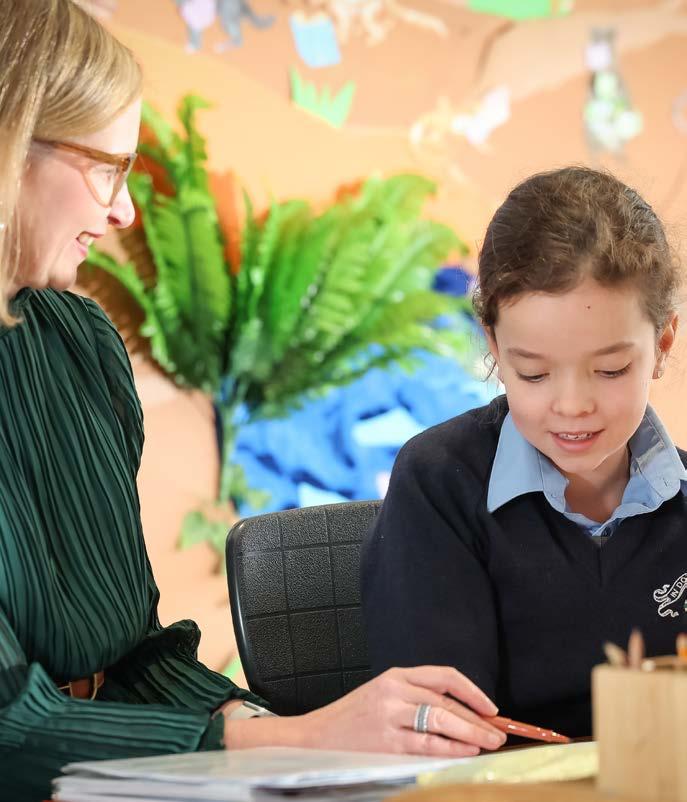
Fluency is the ability to read a text accurately and quickly. It involves automatic word recognition and grouping of words to support gaining meaning from what is read. Fluent readers read effortlessly and with expression.



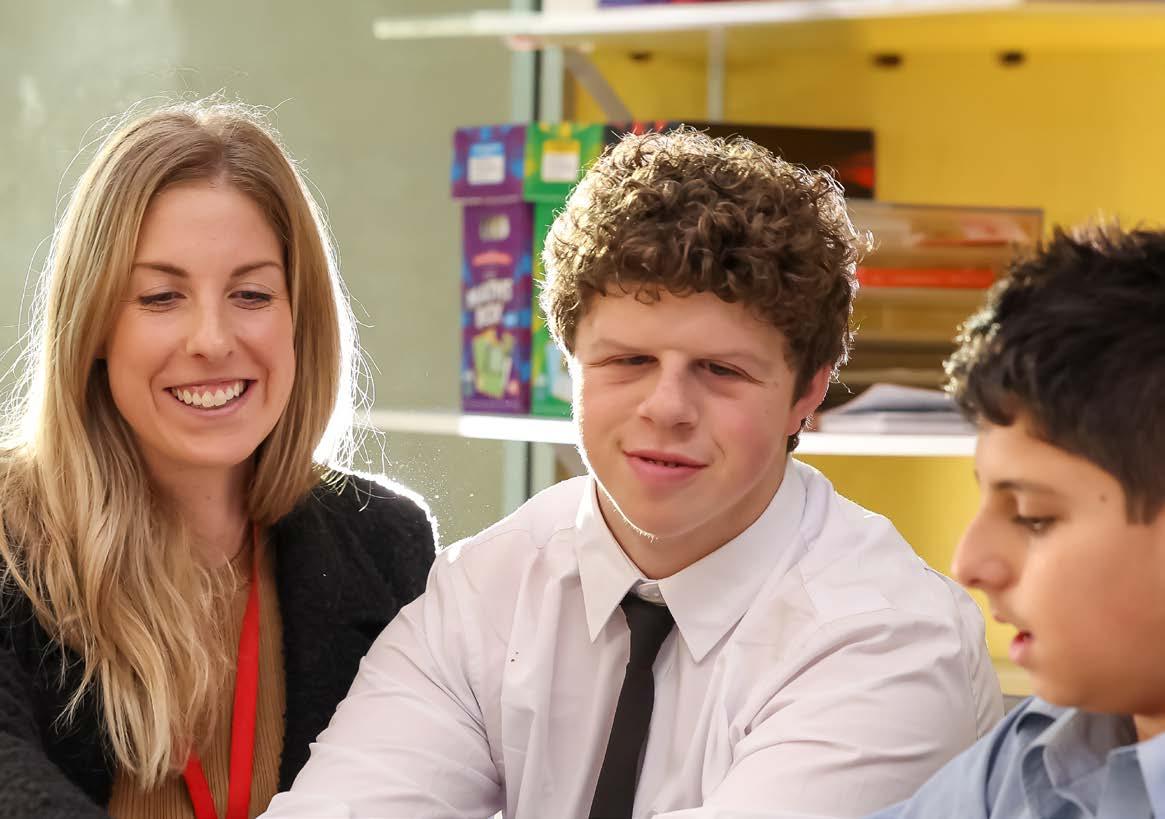

“We are so grateful to the whole team at The King’s School. Each teacher, Boarding Housemaster, mentor, Health Centre staff member and student we’ve connected with has given experienced, professional, personable, encouraging and motivating support to our son Darcy and our family as Darcy became and continues to grow as a Kingsman.
The Education Support Services (ESS) Team is incredible. Dyslexia and learning difficulties can be so challenging. From the moment we connected with King’s and the ESS team, we have not felt that challenge. Instead, they’ve accepted Darcy for who he is, encouraged his strengths, supported his growth and applauded his progress. Despite a big change to boarding away from home, he quickly settled, his confidence has grown, and he is flourishing.
There is a wonderful cohesiveness and inclusiveness within King’s. Darcy attends a variety of classes ranging from small to medium and standard classes. He has always felt accepted, included and appreciated by his peers and the staff. He feels an innate sense of belonging at King’s and with that comes pride and motivation for the pathway ahead. What a joy for any parent to witness!
Thank you, Education Support Services and The King’s School.”
Louisa Bragg Senior School parent

“
I’m very happy with the support my teachers have given me, and I feel like I can talk to them about anything.
For Hamilton Taylor, his time at the Senior School was nothing short of the King’s experience. As a boarder from Years 7 to 12, Hamilton immersed himself in all that The King’s School has to offer. From weekend sport to his love of Agriculture, Hamilton was given the support and confidence both inside and outside of the classroom, to make his school journey positive and memorable.
Hamilton was a student who required additional educational support across all subject areas at school. From Years 7-10, a teacher assistant supported Hamilton in every class to ensure he had one-on-one support and an individually designed learning program that catered to his needs. In Years 11 and 12, his schedule included a mix of King’s Inclusive Education Program (KIEP) for Maths and English and mainstream classes with teacher aide assistance as required.
“I liked being in the KIEP classes as they are much quieter and I could focus on my work, but I also enjoyed being with my mates in the mainstream classes. I’m very happy with the support my teachers gave me, and I felt like I could talk to them about anything. Year 12 was hard, but my teachers helped me during KIEP classes and in my study periods.”
Hamilton’s learning plan for his HSC was developed by The KIEP Co-ordinator and Teacher, Miss Tara Cameronne, in collaboration with Hamilton and his parents.
“Hamilton’s program included practical subjects that gave him life skills for the future. My role was to provide Hamilton with additional learning support to prepare him for the world outside of school and ensure that he is organised, focused and on task.”
Hamilton recalls feeling both surprised and excited to discover the Agricultural experience on offer at King’s. His dedication to the Agricultural program has remained pertinent throughout his King’s journey and his HSC program reflected this. As a Stage 6 Life Skills Agriculture Course Student, Hamilton has learnt to drive a tractor, care for cattle and learn basic farming skills.
It’s not just a tractor that Hamilton is learnt to drive, outside of school he worked to attain his pilot licence. This is a true testament to the positive, ‘never-give-up’ attitude that has been instilled in Hamilton by his family and the School support network.
Like all Kingsmen, Hamilton has participated in a range of challenging and adventurous experiences that promote a healthy risk appetite. He was an active participant in Corps Camp over his years at the Senior School, acknowledging how rewarding it was to complete the confidence course alongside his mates. His involvement in the King’s Cadet Program earned him the rank of Lance Corporal.
Of all the King’s experiences in which Hamilton had participated, the beloved mountain bike track was where Hamilton truly made his mark. “Hamilton tried many of the co-curricular activities at the School including Rugby and Rowing, but he was most confident on the bike track. “We loved watching his enthusiasm and confidence evolve,” said Miss Cameronne.
Hamilton planned to explore his options after graduating from school. He wants to complete his pilot licence and gain some paid work opportunities while he discovers where his next step will take him.
There is no doubt that the support and assistance from ESS has given Hamilton the opportunity to graduate with a HSC certificate, essential life skills and an ability to take on challenges with a positive King’s attitude.

As a Year 7 student, James found it difficult to talk with teachers and friends about his vision impairment.
Admitting that he needed extra support in the classroom was a challenge. When that support was implemented, James became a confident, exemplary student who graduated a successful Kingsman with the world at his feet.
“There were many moments early on when I found it hard to speak up about my vision impairment, but I soon realised that the teachers at King’s were approachable, passionate and had our best interests at heart. This made it easy to communicate with them about my needs and in turn, has set a benchmark for me as an adult and university student,” says James.
The ESS Department provided James with a range of additional supports to help manage his impairment in the classroom and during assessments and examinations. By providing him with suitable learning equipment, such as a large laptop screen and examination papers with a bigger font size, James was able to perform his work at full capacity.
“I would complete my exams and assessments in the ESS classrooms to ensure I was set up correctly and allocated rest time when needed. By Year 12 we had ironed out all my needs, which made the HSC a positive experience.”
After trialling the boarding experience briefly in Year 9, James took up permanent residency in the Bishop Barker Harris Boarding House for his final two years of Senior schooling. As a busy and hardworking student, it made sense to live on campus so that he could manage his study and co-curricular commitments.
James developed a keen interest in Modern History and Economics, crediting his experienced and enthusiastic teachers for inspiring him. Outside of the classroom, James was a standout Basketball player who represented King’s in the 1st Basketball team and participated in Basketball tours over the years.
“I learned so much as a boarder and through the co-curricular program at King’s. There is a great social aspect to playing sport and boarding with your mates. You develop strong friendships and there is always someone around to motivate and support you. I found it very rewarding.”
In Year 12 James was appointed a Captain of Gowan Brae. As a mentor to the Year 7 house, James took it upon himself to lead by example and promote the mindset that you can achieve anything with the right support and attitude.
“I enjoyed this leadership role and in many ways, it led me to the Australian National University where I am currently completing a Double Degree in Economics and Psychology. I’m now living on campus and looking for work in schools where I can provide that same mentorship. It was very rewarding to nurture and support the youngest boys as they found their place at boarding school.”
From a shy, apprehensive Year 7 student to an outstanding King’s graduate who encompasses all the values of a true Kingsman, James has surely left his mark on the School community. He has set standards not only for himself but also, due to his collaboration with the ESS Department, he has paved pathways for future students who, with the right support, will achieve great things!
“ There were many moments early on when I found it hard to speak up about my vision impairment, but I soon realised that the teachers at King’s were approachable, passionate and had our best interests at heart.
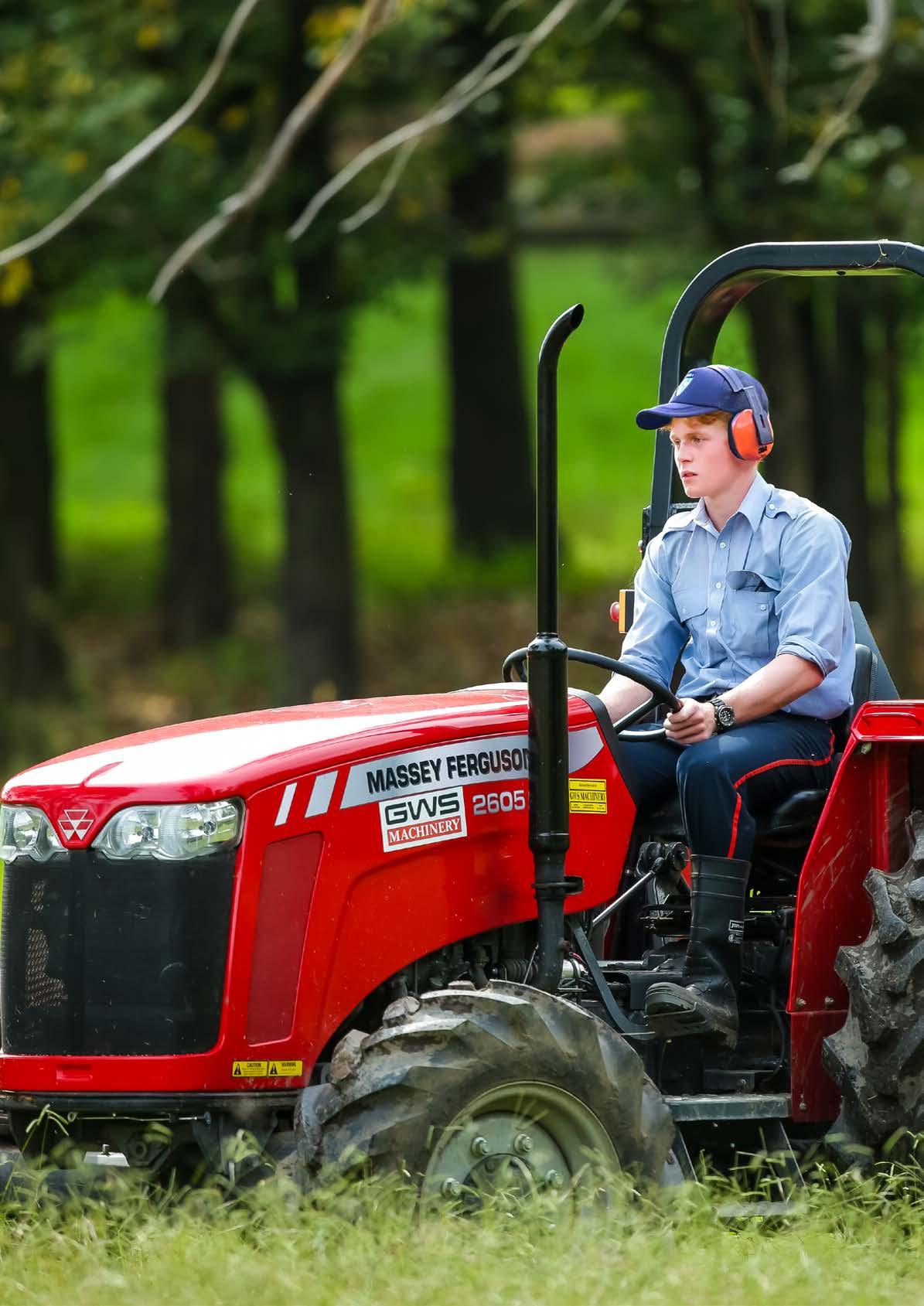

The King’s School is committed to preparing its young men to take their place in the workforce or go on to further studies. Every student learns differently and there is no ‘one-size-fits-all’ approach to learning.
For some students, learning takes place through practical experiences at school or in the workplace. Vocational Education and Training (VET) are courses accredited by the NSW Education Standards Authority (NESA) and can count towards a Record of School Achievement (RoSA) and NSW Higher School Certificate (HSC). These courses provide students with a practical hands-on style of learning, allowing them to achieve success in their chosen area and provide them with real-world experience and work-ready qualifications.
VET programs in schools have significantly increased over the past decade, offering students the opportunity to gain a nationally recognised Australian Qualifications Framework (AQF) Certificate I, II or III at school, whilst completing their Higher School Certificate.
VET courses not only appeal to the interests and aptitudes of young people, but they also reflect the realities of the job market and its shifting demands for skills and training. The provision of industry and university-recognised VET courses expand opportunities for students and enables them to move into the workforce with skills and confidence.
The King’s School provides students with a VET course program that creates maximum global opportunities for students after they leave King’s. The VET courses offered are packaged and delivered by highly trained and qualified staff, in line with national standards and practices. Schools are also supported by a dedicated team of VET professionals, who regularly audit each school’s performance against the National Standards of Registered Training Operations (RTOs).
These courses are designed to complement student interests, school specialisations’, and provide experiences that lead to the development of transferable skills. Whilst studying VET courses, students are required to apply their classroom learned industry skills in a real work environment, by completing a mandatory work placement. King’s has a rich diversity of relationships that exist in the community. The School is currently establishing strong partnerships within the community and with local businesses and industries. These relationships will provide a platform for high-quality work placement opportunities for the boys.
Not only do Stage 6 VET courses contribute to the HSC some can also contribute to the ATAR. This pathway gives young people a significant advantage as they transition to further studies and work.
“ VET courses not only appeal to the interests and aptitudes of young people, but they also reflect the realities of the job market and its shifting demands for skills and training.

